A long year has finally come to an end. We are still spending our last days in Ali Al Salem AB, Kuwait waiting for the “Freedom Bird” to transport us to BWI Airport. Here we will say our goodbyes and each of us will take a different connecting flight back to our homes and to our families who are anxiously awaiting our arrival. It will be a bitter sweet moment when this happens. It has been a long year we’ve shared together.
When you live, sleep, and eat with a group of men over a year’s period of time, you develop a bond that is not only professional but personal as well. These are the same team members you entrust your life to when going on a mission outside the wire. But the bond my Air Force brothers shared was rather unique and I never experienced this type of closeness on any other deployments in the past. Prior to this deployment, most of us had never met or knew each other. We were assembled as a team at Fort Riley, Kansas. Of the 10 personnel featured in the photograph, 8 of us were on the same team and shared the same open-bay sleeping quarters and trained together as a team.
When you have this type of an arrangement, it’s hard not to learn about the personal lives, ambitions, and goals of your fellow members. Even though we had a rank structure to include officer and enlisted, we established a strong bond of unity and personal friendship. Being assigned to the Army had its challenges, but we learned the Army procedures and before long, we were conducting our own missions using Army vehicles and weaponry. Our journeys took us outside the wire to some very remote villages. Whether you were a gunner, driver, or truck commander, everyone played an integral role and you learned to trust each person with your life and theirs in return. Unlike many teams who struggle with the forming and storming stage, our team quickly advanced past the norming stage and moved into the performing phase. Bottom line: We were damn good at what we did and efficient at how we did it!
Our primary mission was to mentor the Afghan National Army (ANA) on logistics processes. First, we had to understand the basic Afghan supply system patterned after the Army’s antiquated supply processes. Then we were expected to advise our ANA counterparts on the intricacies of this logistics process. Not only did we succeed, but collectively we excelled at our first camp with our ANA counterparts. Our ANA Kandak was awarded the Minister of Defense’s Capability Milestone 1, which is the highest rating a unit can receive and the warehouse area was lauded as “best seen to date.” So this was testament to what our team could achieve.
Not only did we accompany our ANA counterparts on logistics missions, we went on joint humanitarian missions to some secluded villages nestled in the Hindu Kush Mountains. While on these journeys we saw poppy fields as far as the eyes could see and crude mud brick houses without electricity. I affectionately called this “driving through the Old Testament area.” We saw towering mountains and climbed a few along the way too. It truly was an experience!! Despite being exposed to the perils of rockets, mortars, RPGs, small arms fire, IED devices, and planned Taliban ambushes, we came out of this deployment unscathed.
Unfortunately, we attended the memorial services of our camp mates and mourned for those who had their life taken by the insurgents we are at war with. These men and women are the true heroes and their sacrifices will never be forgotten.
In the end, the US Army recognized our accomplishments as well and awarded my entire team Bronze Star Medals for “Exceptionally meritorious service in support of Operation Enduring Freedom … personal courage and commitment to mission accomplishment in a combat zone, under the most extreme of circumstances, greatly contributed to the success of Operation Enduring Freedom.” What makes this medal so unique (without being self-serving) is that this is an Air Force team who was given an Army mission and performed remarkably in a combat zone. I don’t know how many Air Force teams can make this same claim because it’s truly a unique accomplishment. In fact, as the Army migrates to the “partnership concept”, the
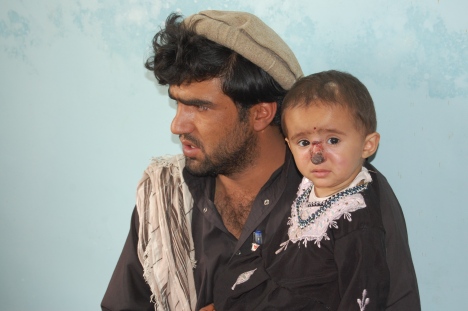
We helped treat this little girl during a village medical mission in June 2009; her nose was rotting away from Mucocutaneous Leishmaniasis disease.
Embedded Training Teams (ETT) will disappear. We were one of the last Air Force ETT teams left in Afghanistan and can proudly mark our place in history.
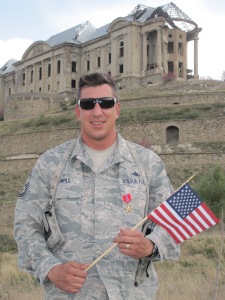 Tomorrow we fly our final leg of this journey together and then will go our separate ways when we land in Baltimore. It’s not a final goodbye because I have a feeling sometime in the future we will see each other again. But this will be the last time we serve in this capacity as a team. To my Air Force Band of Brothers, it was an honor and a privilege to serve with you. I wish you all the best and to your families who are anxiously awaiting your return. We can be proud of what we did and let us never forget, freedom is not free.
Tomorrow we fly our final leg of this journey together and then will go our separate ways when we land in Baltimore. It’s not a final goodbye because I have a feeling sometime in the future we will see each other again. But this will be the last time we serve in this capacity as a team. To my Air Force Band of Brothers, it was an honor and a privilege to serve with you. I wish you all the best and to your families who are anxiously awaiting your return. We can be proud of what we did and let us never forget, freedom is not free.
Filed under: Missions | Tagged: Afghan National Army, Afghanistan, Ali Al Salem AB, ANA, Bronze Star, Deployment, ETT, Kuwait, U.S. Air Force, war | 19 Comments »


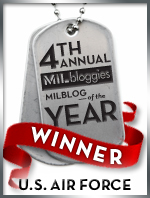
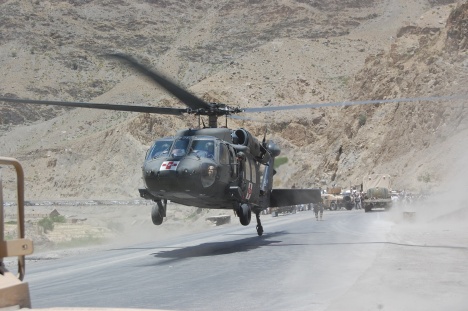
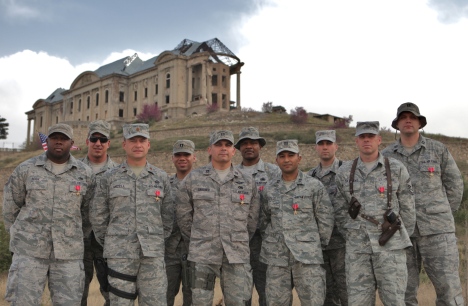
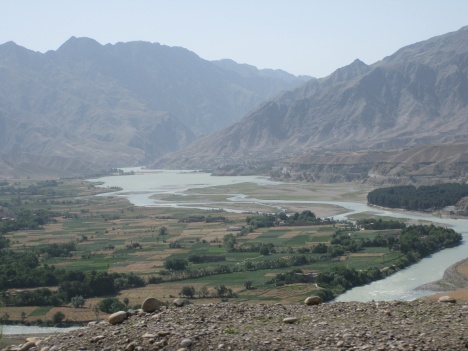
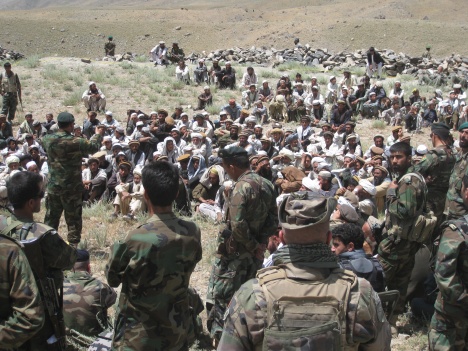
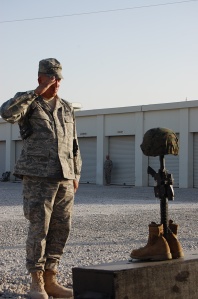










 My team was invited to join the Afghan leadership in a specially prepared meal. Immediately I panicked because I forgot to put a spare spoon in my pocket for this occasion. As we sat down at the table I scanned it carefully and no flatware was to be seen.
My team was invited to join the Afghan leadership in a specially prepared meal. Immediately I panicked because I forgot to put a spare spoon in my pocket for this occasion. As we sat down at the table I scanned it carefully and no flatware was to be seen.  We would have to eat the meal with our hands. The cook was stirring some sort of egg mixture in a steel pot on the floor. It was equivalent to our eggs Ranchero. On the table, the paper plates were filled with some basil leaves, Italian Parsley, small slides tomatoes and cucumbers and in honor of us they made some sort of French fries. After watching our hosts eat, I mimicked them and followed suit. The Nan bread substituted for the missing spoon for scooping up the eggs Ranchero. We ate our meal, exchanged some pleasantries and then returned to our camp.
We would have to eat the meal with our hands. The cook was stirring some sort of egg mixture in a steel pot on the floor. It was equivalent to our eggs Ranchero. On the table, the paper plates were filled with some basil leaves, Italian Parsley, small slides tomatoes and cucumbers and in honor of us they made some sort of French fries. After watching our hosts eat, I mimicked them and followed suit. The Nan bread substituted for the missing spoon for scooping up the eggs Ranchero. We ate our meal, exchanged some pleasantries and then returned to our camp.